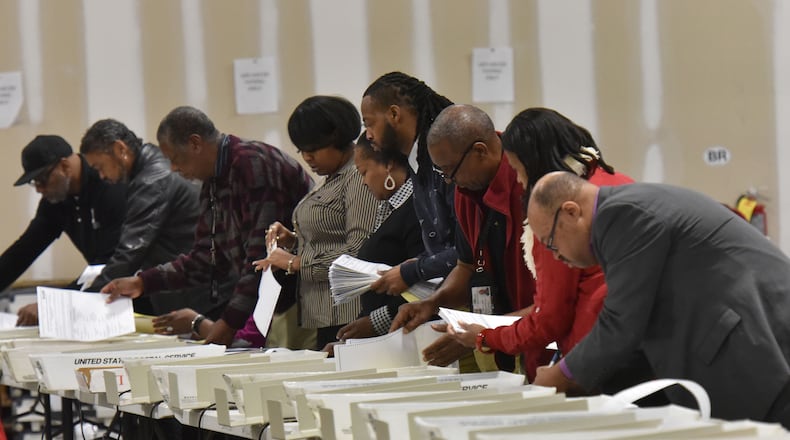To ensure the security of votes on election night, Fulton County will use police escorts to bring completed electronic voting cards to a central warehouse to compute the results, the county's elections director said Thursday.
Richard Barron said he was making the change at the request of state officials.
In the past, Fulton County has used analog phone modems at a number of check-in centers to upload results before driving voting cards to the warehouse. Because Fulton’s geography is so broad, the change may delay when results are reported, Barron said.
He said the secretary of state's office requested Fulton make the change as a result of a court case in which election advocates asked a federal judge to require paper ballots this fall, saying the election was vulnerable. The judge ruled that Georgia can keep using electronic voting machines, but said state election officials "had buried their heads in the sand" about vulnerabilities in the state's voting system.
Barron said he believes Fulton was the only county to upload its results via modem — all others drive theirs in — but there were no security issues related to the use of modems.
“It’s the most secure part of the entire process,” he said of the phone lines. “I think it makes no difference. I think there’s more risk driving them.”
Barron worried about the possibility of car accidents, and whether the decision will delay Fulton County’s results reporting. In recent years, the county has made additional efforts to report results earlier after errors and delays that led to vote tallies coming in in the wee hours of Wednesday morning, and after other metro Atlanta counties.
He plans to ask if the 25 officers driving voting cards in to the west Midtown warehouse can use blue lights to guarantee a speedier return.
In previous years, Fulton County has had a number of issues with its elections. In 2007, a batch of voter registrations was tossed in a Dumpster. Absentee ballots were mismanaged in 2008. The county failed to properly register voters in 2012, leading 10,000 people to cast provisional ballots in that year's presidential race.
In 2016, precinct cards were returned to sender, instead of arriving at voters' homes. Later that year, the county came under fire for sending letters directing more than 20,000 residents to the wrong polling location. And the county has often reported its results hours after other jurisdictions completed their tallies.
Barron said the secretary of state’s office had been asking the county to make the change away from modems “for years.” Brian Kemp, the current secretary of state, is the Republican nominee for governor. He is running against Democrat Stacey Abrams. A spokesperson for Kemp’s office did not respond to a phone call or an email seeking comment about the request.
Charles Bullock, a political science professor at the University of Georgia, said having the cards driven to a central location might “allay some concerns” about the election. He said he didn’t think the decision was harmful, but he also didn’t know that it would make a difference.
“It’s good optics, probably,” he said. “No one can hack it while you’re driving.”
Bullock said he wasn’t aware of any other counties that used police escorts for voting cards, and he didn’t expect any others to begin using officers.
Poll workers will still bring voting cards to check-in centers around the county, Barron said, where officers will leave at 15-minute increments to take the cards into Atlanta. He said each officer will have a poll worker as a passenger to ensure no one is left alone with the voting cards.
Barron estimated the change could cost the county about $5,000 in overtime pay for officers.
Fulton will continue to use assistants to help close down polling locations on election night, which Barron said has helped speed up the reporting process in the past.
“We’ll see how this goes,” he said. “If everything runs like clockwork, it might work out to be the same.”
Mary Carole Cooney, chairperson of the Fulton County Board of Registration and Elections, said she thought the county’s process was “fairly secure” before the change — “To the extent that we’re not, people would have to do it machine by machine,” she said.
Still, Cooney said the move to driving would eliminate what some might consider a vulnerable point in the system. She said the change has been a matter of discussion for some time.
About the Author
Keep Reading
The Latest
Featured




